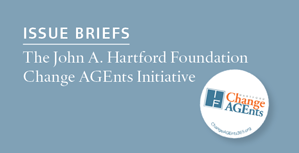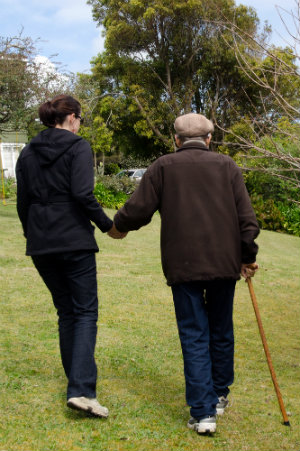 This is the first in a series of seven issue briefs.
This is the first in a series of seven issue briefs.
The John A. Hartford Foundation Change AGEnts Initiative accelerates sustained practice change that improves the care of older adults. It does this by harnessing the collective power of The John A. Hartford Foundation’s interprofessional community of scholars, clinicians, and health system leaders.
In December 2015, nearly 100 John A. Hartford Foundation Change AGEnts gathered in Philadelphia, PA to identify challenges and opportunities for improving care of older adults in several care settings and issue areas. Each group worked toward identifying actionable areas for John A. Hartford Foundation Change AGEnts, the Foundation, and colleagues in the field to pursue. The brief below represents the summary of the Dementia Care group's proceedings and should inform future work to create widespread and systemic changes in the care of older adults.The other issue briefs will be published on Health AGEnda over the following weeks.
 Dementia Care
Dementia Care
More than 5 million people in the United States today suffer from Alzheimer’s disease and other forms of dementia, a number expected to grow to nearly 14 million by 2050 as the number of older people increases. Recent policy and media attention has focused on galvanizing public will and resources toward addressing dementia, which costs U.S. families and the health care system $225 billion annually (a number that may balloon to more than $1 trillion in the next 35 years).
This interest, however, has been primarily focused on finding a cure for Alzheimer’s and other related forms of the disease. Finding a cure is critical, of course, but these proposals do not generally drive attention toward the immediate and very real needs of the millions of people who already have dementia (or even cognitive impairment) or those who may develop these conditions in the years before we find a cure.
The Dementia Care Issue Group at The John A. Hartford Foundation Change AGEnts Conference dedicated its attention to these matters. It included leaders working in the wide range of settings (from the home/community to skilled nursing and other institutions) where those diagnosed with dementia and those with cognitive impairment receive care. In one way or another, each member of the group was interested in how we can recognize, diagnose, and address cognitive impairment or dementia more routinely and effectively.
Challenges
Barriers to improving dementia care: Care for persons with a diagnosis of dementia or evidence of cognitive impairment must involve support for the person with the disease, as well as those family members and friends acting as caregivers. Therefore, identifying a caregiver, and his or her health and other concerns, is critical. The barriers to adequate recognition and response to the combined needs of people with dementia and their family caregivers, however, can be found at several levels:
- Individual caregivers may lack awareness of their role, have poor access to services, and/or experience fear or stigma about being a caregiver of someone with dementia (and of course people with cognitive difficulties may have similar fears as well).
- Providers/clinicians must make sense of “competing” co-morbidities of people with dementia, may lack knowledge about the disease, and require guidance about how to manage the needs of patients with dementia and their caregivers, particularly those from traditionally underserved cultures and communities. They may even have generally private, but negative, views about addressing the disease (e.g., “why bother if there is no cure”).
- Health care systems may not pay sufficient attention to dementia care, due to lack of adequate financial reimbursement for diagnosis, inadequate supply of providers with expertise in this area, failure to understand the importance of cognitive health and/or a more general failure to support non-medical services, which are critical to dementia care.
Group members recognized that driving further attention for dementia care (including cognitive impairment) requires informing all key stakeholders of both the harms of sub-standard care (e.g., medication non-adherence and failed management of other “expensive” physical health conditions like congestive heart failure and diabetes) and the benefits of better services for this population, which can reduce suffering and costs.
All of these challenges are exacerbated by the reality that the needs of individuals with dementia and their caregivers are complex and longitudinal in nature. As such, they require expertise from multiple disciplines and support from different parts of health systems and communities as well as in transitions across care settings.
Opportunities
Looking ahead: There are a number of important ways that The John A. Hartford Foundation Change AGEnts and other advocates can create more visibility, as well as opportunities for action around improved dementia care. Notably:
- The Veteran’s Health Administration (VHA) and the increasing number of systems using value-based payment models (e.g., Accountable Care Organizations, Medicare Special Needs Plans, and Medicare-Medicaid Duals Demonstrations) have population-level incentives and therefore a greater potential to adopt dementia interventions that are person-centered (for those with dementia and their caregivers), team-based, and include social-health-behavioral support across settings. Independent of bundled payment or population health models, there is a growing need and interest in caring for those with dementia in different settings (e.g., dementia-friendly hospital care, patient-centered medical homes with effective dementia care, etc.) and how to support emerging populations like individuals with cognitive impairment who are living alone. Given these opportunities, dementia care advocates working within health care and social services settings need tools to advance greater awareness of this critical issue. This includes tools and resources to make the business case for effective dementia care models and develop effective value propositions for this work. For instance, what is a persuasive case for improved attention to cognitive impairment and dementia in different settings? In the hospital, for example, how can the emphasis on “never events” and readmissions penalties be aligned with better care of persons with dementia?
- The Institute of Medicine report on Family Caregiving for Older Adults will be completed in 2016 and may draw attention to an increased focus on identification and support for caregivers of persons with dementia. The John A. Hartford Foundation is a supporter of this work, and many of its grantees and partners (e.g., the Gerontological Society of America and the American Geriatrics Society) are positioned to advance helpful dissemination activities and other meaningful responses.
- Efforts around the National Plan to Address Alzheimer’s Disease created through the National Alzheimer’s Project Act (NAPA) also suggest several opportunities. There have been some indications that a National Summit focused on care practices may occur in 2016. In addition, Laura Gitlin, PhD, from Johns Hopkins University and Gary Epstein-LuBow, MD, of Brown University, both of whom serve on the John A. Hartford Foundation Change AGEnts Dementia Caregiving Network, are newly appointed members to the plan’s Advisory Council, which is an important platform for increasing attention to care, in addition to investing in a cure. NAPA has also asked the Alzheimer’s Association to flesh out milestones for improving care. These recommendations should be published soon during 2016 in the Association’s journal.
- The anticipated report from International Consortium for Health Outcomes Measurement, which seeks to transform healthcare systems by measuring and reporting patient outcomes in a standardized way, should be noted as well. The Consortium will have its report-out on dementia in 2016. On a related front, the American Academy of Neurology (AAN) and American Psychiatric Association (APA) have formed an interprofessional Dementia Measurement Set Update Work Group to review dementia management measures. The final report of their work (a draft of which was reviewed by The John A. Hartford Foundation Change AGEnts Dementia Caregiving Network) will be out in 2016.
Further action: In addition to these larger opportunities, there are several other ways this Issue Group noted that Change AGEnts and other health care leaders can ensure positive progress in dementia care, particularly by engaging or leveraging some or all the following groups and their ongoing work:
- Dementia Friendly America is a multi-sector, national collaborative looking to foster communities that are equipped to support people with dementia and their family and friend care partners by working to become “dementia friendly.”
- HRSA Geriatric Workforce Enhancement Program has recently awarded grants to 44 organizations in 29 states. Several of these projects focus on dementia care as one key element of geriatrics education and training. Workforce is a significant issue in dementia care, and workforce needs should be considered in all practice change efforts.
- VHA has made substantial investments in dementia care through widespread adoption of programs such as Project REACH and the establishment of dementia care committees within several VA Medical Centers. VHA has also mandated some support for caregivers (originally motivated by concern for post 9/11 veterans).
- The Gerontological Society of America Workgroup on Cognitive Impairment Detection and Earlier Diagnosis has valuable tools and/or activities to share across the settings of care.
- Some vital decisions affecting dementia care take place at the state level, and some states (notably Minnesota, but also others) have accomplished meaningful improvements in dementia care through collaborative efforts. Dementia care advocates should explore opportunities with state Alzheimer’s plans, as well as in state Medicaid policy that drives home- and community-based services and reimbursement.
- The Administration for Community Living is also emphasizing Dementia Capability and has several opportunities under the The Alzheimer’s Disease Supportive Services Program (ADSSP) to expand the availability of community-level supportive services for persons with Alzheimer’s Disease and Related Disorders (ADRD) and their caregivers.
- The Lancet has commissioned what will likely be an influential report on dementia care that will be published in 2017. It will identify best practices globally in dementia care and what can be done now.
- The John A. Hartford Foundation Change AGEnts Dementia Caregiving Network has several action projects underway, descriptions of which can be found here.
Despite the significant challenges facing people working to improve the care of those with dementia and boost recognition and support of their care, there is much hopeful activity in the environment and a growing number of groups and resources available to move this work ahead. The John A. Hartford Foundation and its Change AGEnts community of leaders are well positioned to build on this momentum and lead critically needed improvements in how we screen, treat, and ultimately care for the growing number of older people with cognitive impairment and dementia and the family members and friends who dedicate much of their lives to caring for them.
Dementia Issue Group Participants
Nancy Wilson, LMSW (Senior Respondent)
Baylor College of Medicine
Rachel Watman, MSW (Facilitator)
The John A. Hartford Foundation
Laurie Lindberg, Hartford Change AGEnts Initiative (Notetaker)
The Gerontological Society of America
Jane Bavineau, Neighborhood Centers Inc
Angela Catic, MD, Baylor College of Medicine
Michael E. DeBakey VA Medical Center
Patricia M. D’Antonio, RPh, MS, MBA, CGP
The Gerontological Society of America
Susan Gilster, PhD, RN
The Gilster Group
Laura Gitlin, PhD, Center for Innovative Care in Aging
Johns Hopkins University
Denise Lyons, MSN, RN, AGCNS-BC, FNGNA
Christiana Care Health System
Heather Menne, PhD
Benjamin Rose Institute on Aging
Eran Metzger, MD
Hebrew SeniorLife
Rosa Palacios
Commonwealth Care Alliance
Mary Lynn Piven, PhD, RN
UNC-CH Chapel Hill School of Nursing
Alan Stevens, PhD, Center for Applied Research, Baylor
Scott & White Health
